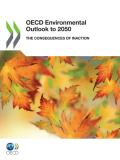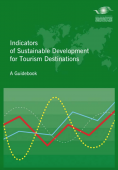This publication offers a general introduction to sustainability impact assessment, which is an approach for exploring the combined economic, environmental and social impacts of a range of proposed policies, programmes, strategies and action plans. Such assessments can also assist decision-making and strategic planning throughout the entire policy cycles. It is not an in-depth or detailed user manual, but rather outlines basic principles and process steps of sustainability impact assessments, drawing on examples from Switzerland, Belgium and the European Commission, among others. This publication is a valuable source of information for policy makers on sustainability impact assessments.
This publication (the 10th edition of Greenhouse Gas Market) brings together carbon market professionals, policymakers, academics and NGOs to provide in-depth analysis and perspective on the main issues affecting carbon policy worldwide. IETA is global in its outreach and the publication features latest developments in current and emerging carbon markets, as well as taking a step back to consider the wider implications of climate policy design and implementation.

Based on joint modelling by the OECD and the Netherlands Environmental Assessment Agency (PBL), this document looks forward to the year 2050 to find out what demographic and economic trends might mean for the environment if the world does not adopt more ambitious green policies. It also looks at what policies could change that picture for the better. This Outlook focuses on four areas: climate change, biodiversity, freshwater and health impacts of pollution, identified as 'red light' issues by the previous 'Environmental Outlook to 2030' publication. This summary was prepared by Eldis.

This report suggests a conceptual framework for the new statistical field “ICT and the environment” based on an existing OECD framework for information society statistics. Sources of official data to populate the framework are investigated and some relevant work has been identified. Given the serious environmental problems facing the world, and the potential for ICT to both lessen and worsen those problems, it is suggested that this field should be of more interest to official statisticians. A number of actions are recommended and they include: conducting new or expanded household and business surveys, expanding statistical classifications to better reflect ICT and the environment, ensuring that sample sizes are sufficient to enable better identification of ICT and environment data, and producing time series data on the topic. This summary was prepared by Eldis.
Mitigation and adaptation climate change policy cuts across all sectors of the economy and broader national priorities, such as poverty alleviation, sustainable development and economic growth. This paper outlines the evolution of the low-emission development strategies (LEDS) concept in the climate policy discourse and explores the existing strategies, action plans and documents. It defines LEDS as forward-looking national development strategies that encompass climate-resilient economic growth and looks at how they can ensure that they are effective and efficient in delivering intended goals. The aim of the paper is to:
Investment in network infrastructure can boost long-term economic growth in OECD countries. Moreover, infrastructure investment can have a positive effect on growth that goes beyond the effect of the capital stock because of economies of scale, the existence of network externalities and competition enhancing effects. This paper, which is part of a project examining the links between infrastructure and growth and the role of public policies, reports the results on the links with growth from a variety of econometric approaches. Time-series results reveal a positive impact of infrastructure investment on growth. They also show that this effect varies across countries and sectors and over time. In some cases, these results reveal evidence of possible over-investment, which may be related to inefficient use of infrastructure. Bayesian model averaging of cross-section growth regressions confirm that infrastructure investment in telecommunications and the electricity sectors has a robust positive effect on long-term growth (but not in railways and road networks). Furthermore, this effect is highly nonlinear as the impact is stronger if the physical stock is lower.
This working paper assesses opportunities and policies for green growth in the Chicago Tri-State Metropolitan Area. It first examines the Chicago metro-region's economic and environmental performance and potential constraints to regional growth, and identifies emerging regional specialisations in green products and services. This is followed by a review of sector-specific policies that can contribute to green jobs, green firms and urban attractiveness, with particular attention to energy-efficient buildings, the wind energy industry, public transportation, and the water and waste sectors. Finally, the working paper considers the role of workforce, innovation and governance policies, focusing on skill shortages and skill mismatches in the regional labour market, ways to make the most of the region's innovation assets, and opportunities for regional institutional co-ordination.
This is the final report for the joint Adam Smith International and Vivid Economics ‘study of mechanisms to incentivize the financial sector to scale up financing of green investment in Jordan’. The overall aim of the study is to identify the barriers associated with private sector financing of ‘green economy’ activities in Jordan. The study also proposes possible ways to overcome these barriers, drawing, where appropriate, on experiences in other countries. The decision to undertake this study was taken in 2010 by Jordan’s Prime Minister and Ministry of Environment following a Green Financing Seminar held by the Ministry of Environment and the Association of Banks of Jordan. It also follows a Scoping Study – Towards a Green Economy carried out by the United Nations Environment Programme (UNEP) in partnership with the Ministry of Environment carried out in 2011.
Growing concerns about the environmental unsustainability of past economic growth patterns and increased awareness of a potential future climate crisis have made it clear that the environment and the economy can no longer be considered in isolation. At the same time, the financial and economic crisis has provided the opportunity for policy interventions aimed at encouraging recovery and renewed growth on more environmentally and socially sustainable grounds. A strategic vision is necessary to ensure that, during the crisis exit and beyond, the policies that governments will implement are the most appropriate from an economic efficiency, environmental integrity and social equity point of view, as well as coherent both at a national and an international level.
